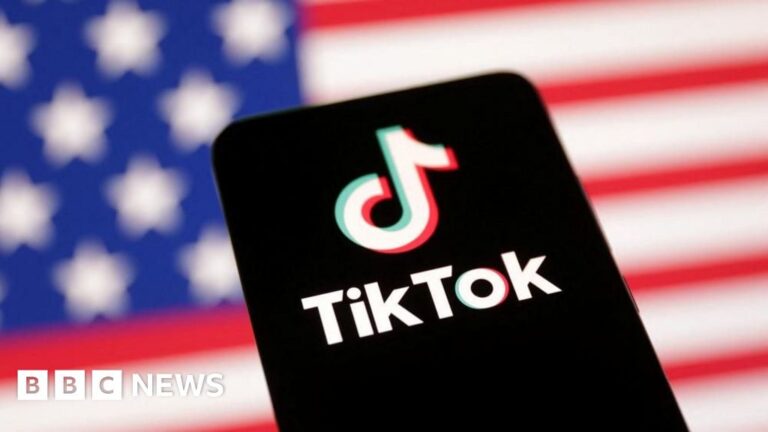Reuters
The American flag and TikTok logo are seen in this illustration taken on January 8, 2025.
TikTok will appear before the U.S. Supreme Court on Friday in a last-ditch effort to overturn a ban, in a case testing the limits of national security and free speech.
The popular social media platform is challenging a law passed last year ordering the company to be separated from its Chinese owner or blocked in the United States by January 19.
The U.S. government says that without sales, TikTok could be used by China as a tool for espionage and political manipulation.
But TikTok rejects this claim, arguing that it was unfairly targeted and that the measure violates the freedom of expression of its approximately 170 million American users.
Lower courts sided with the government, but the case became more complicated last month when President-elect Donald Trump weighed in on the dispute and requested that enforcement of the law be suspended to give him time to find an agreement.
Analysts said the Supreme Court’s decision was unclear, but it would be unusual to overturn the previous decision – even with the blessing of a future president.
“When you pit a real government interest against a real constitutional value, it ends up being a very close call,” said Saurabh Vishnubhakat, a professor at the Cardozo School of Law.
“But in such close cases, the government often gets the benefit of the doubt.”
A decision from the Supreme Court could be issued within days.
Congress passed the law against TikTok last year with the support of both the Democratic and Republican parties. The moment marked the culmination of years of concern over the wildly popular platform, known for its viral videos and its appeal among young people.
The legislation does not ban use of the app, but would require tech giants such as Apple and Google to stop offering it and ban updates, which analysts say would eventually kill it .
TikTok is already banned on government devices in many countries, including the UK. It faces more comprehensive bans in some countries, including India.
The United States argues that TikTok poses a “serious” threat because the Chinese government could force its owner, ByteDance, to disclose user data or manipulate what it shows users to serve Chinese interests.
Last December, a ruling by three appeals court judges upheld the law, pointing to China’s history of acting through private companies and saying the measure was justified as part of a ” broader effort to counter a well-founded threat posed to national security” by the country.
TikTok has repeatedly denied any potential influence from the Chinese Communist Party and said the law violates its users’ First Amendment rights to free speech.
It asked the Supreme Court to strike down the law as unconstitutional or order a halt to its application to allow a review of the legislation, which it said was based on “inaccurate, erroneous and hypothetical information “.
Trump is expected to take office the day after the law takes effect.
He had called for a ban on the app in the United States during his first term, but changed his mind during the election campaign.
The brief filed by Trump’s lawyers late last month takes no position on the legal dispute, but says the case presents “an unprecedented, new and difficult tension between the right to free speech of on one side and foreign policy and national security concerns on the other.” other”.
Noting his election victory, he said Trump “opposes banning TikTok” and “seeks the ability to resolve ongoing issues through political means once he takes office.”
The filing came less than two weeks after Trump met with the TikTok boss at Mar-a-Lago.
One of the president-elect’s major donors, Jeff Yass of Susequehanna International Group, is a major shareholder in the company.
However, Trump’s nominee for secretary of state, Florida Sen. Marco Rubio, supports banning the platform.
Investors who have expressed interest in buying TikTok include former Trump Treasury Secretary Steven Mnuchin and former LA Dodgers owner Frank McCourt.
Attorney Peter Choharis, part of a group that filed its own brief supporting the U.S. government’s case, said it was difficult to predict what the court — which has a conservative majority — would do, noting that several recent court decisions have overturned long-standing precedent. .
But he added that even if Trump had the opportunity to try to reach a deal, he would expect a ban eventually.
“I don’t see any president, including future President Trump, being able to resolve this issue in a way that is satisfactory for the national security of the United States, because I don’t think ByteDance will accept it,” he said. declared.
The prospect of losing TikTok in the United States sparked outrage among many users, some of whom filed their own lawsuits last year.
In their filing, they said the decision that TikTok could be shut down “because ideas on this platform could persuade Americans of one thing or another – even something potentially harmful to our democracy – is completely antithetical to the First Amendment.”
Other groups weighing in on the dispute include the American Civil Liberties Union and the Freedom of the Press Foundation, which have argued that the United States has failed to present “credible evidence of continuing or imminent harm » caused by the social networking application.
Mr. Choharis said the government had the right to take steps to defend itself, arguing that the fight was not about “speech” or “content” but about the role of the Chinese government.
“It’s about control and how the Chinese Communist Party in particular, and the Chinese government in general, pursue strategic goals using many internet companies and particularly social media companies, including TikTok,” he said. he declared.

